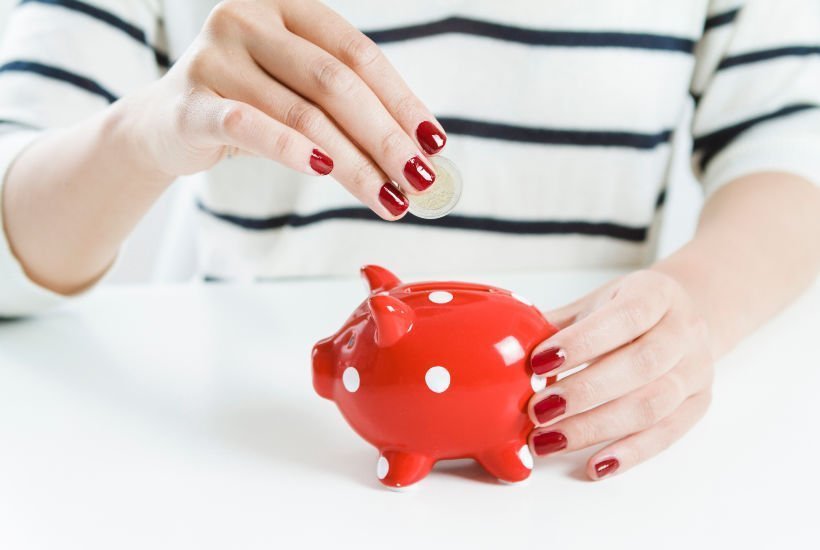Are you finding it hard to allocate areas where you can save money? If so, you are probably not alone. Quite often when people talk about getting out of debt, they hear three suggestions:
- Save £1000 for Emergency Expenses
- Make sure minimum payments are being made on all accounts, then pay extra on one account until it’s paid off.
- When all accounts are paid off, increase savings up to 3-6 months salary or living expenses.
PIN THIS POST FOR LATER

This is actually good advice, but many people find it hard to meet the first suggestion and give up. Even if you are not in debt, you might be looking for ways to start saving money for a large purchase (like a domestic appliance or a big holiday), put a deposit for your first home or save enough money to start a family.
No matter what your current position is, if your budget is already tight, you might find very difficult to start saving any money. It might look like there isn’t anything available, and you feel like you are running out of ideas where to look to save any money.
So, in this blog post I wanted to look how to start saving money when you are on a tight budget or you have a low income. So, let’s talk about a few ways to save that first £1000.
Money Saving Tips
- 7 Tips on starting to save money, that actually work >>
- 10 Tips on how to start getting out of debt >>
- How to stick to your budget >>

Review your fixed expenses
This is one of the areas that most people skip because they just think that you can’t do anything about your regular or fixed expenses.
We all need to pay our electricity, gas or insurance bills, but I think it’s worth looking into alternatives for each area of your fixed spending.
For example, if you own a car, you have to have car insurance as it’s illegal to drive without one. But is your current insurance the best deal?
The easiest way to find is to search online and compare it to other available insurances, like One Sure Insurance, online comparison marketplaces or other insurance providers.
- Tips on how to save on electricity >>
- 14 ways on saving on your house heating bills >>
- How to save money as two generations living together >>

Re-think your spending habits
If you really want to save money and your budget is already very tight, you will need to have a re-think about your current spending habits. Write down things you regularly spend money on and then have a think what you could hold off spending money on until you save what you need or pay off your debt).
I know that this will be hard and some elements you can’t really change – like your rent, utility bills, insurance or other outgoings.
You can certainly shop around for better offer on gas, electricity and other utilities, but those kind of savings (if any) are not going to be enough to help you to save large pot of money.
It will certainly help in a long run to have the best rates for all your utilities, so if you have the time, do have a look into it and try to reduce your rates as much as you can.

Cut out spending that’s not essential
I don’t want to be a kill joy, but if you want to save money quickly, you’ll need to cut out any spending that’s not essential. This could be just for long enough until you save your target figure or you might even decide that it might be worth continuing not to spend so much in certain areas.
The following list is likely going to be different for different people, but here are just a few suggestions:
- Stop eating out
- Stop drinking out or buying alcohol
- Stop smoking
- Don’t have takeaways
- Stop buying clothes, shoes or accessories for the time being
- Cancel memberships or services that are not essential (gym, cinema, cable or sky television)
You can have a go at my ‘No spend January’ challenge any time of the year. It’s perfect way to start your saving journey and help you to prioritise your spending habits.
- How to save on food bills by shopping smart >>
- 10 clever tips for meal planning at home >>
- 6 money saving kitchen hacks >>

Have a look if you can sell anything first
Rather than saving the first £1000 first have a look if you have things of value that you are able to sell. It could be anything from spare kitchen appliances, clothes, handbags or even furniture.
I don’t want you to sell your family jewels or things of sentimental value, but do have a look if there is anything you can try to sell. Apart from the money you’ll get when you sell some of your things, it will also give you the chance to spring clean your flat or house and start afresh.
Make sure that when you do sell anything, put the earnings straight into your savings account and don’t use it for general spending.

find an extra income source
But, what if you don’t have anything you can really part with that is of value to others? Consider any services you are able to offer others (babysitting, lawn mowing, dog walking etc). Can you take a second job and dedicate those earnings to your savings or debt?
Write down everything you spend
Consider tracking every penny you spend for one week. You may be surprised at where you money is going. Perhaps it’s a coffee in the morning or a snack in the afternoon, but it all adds up.

Make some easy swaps & changes
If you’re spending a few pounds here and there, think of an alternate solution (bring a snack from home, make coffee at home in the morning, bring a cup from home and refill it throughout the day), anything to avoid spending anything extra for one week.
- Swap branded food for supermarket brands when food shopping
- Bring your own lunch to work
- Make your own coffee instead of buying it in a coffee shop
- Swap branded make up, toiletries or cleaning products for supermarket own brands or buy cheaper brands
Cook more at home & make your own snacks to take to work and school





save money that you would normally spend
If you’ve been spending cash, keep a jar or ziplock bag with you. Each time you would normally buy something extra, instead, put that cash into your savings container. ‘
If you’ve been spending on your debit card, keep a journal with the amount. Each day (or end of week), transfer that amount (consider rounding up) into savings.
Hopefully, you’ll be inspired by the amount you’ve saved in the one week challenge, and can continue. If you’ve tried this, how much were you able to save each week or month? I’d love to know, and sharing would help encourage others on the same path.
Stay in touch
Hope this post inspires you and of course, I’d love to know what you think! Let me know in the comments below or find me on Instagram, Facebook or Twitter and add the hashtag #practicalfrugality so that I can see your post.
Or why not subscribe to my weekly newsletter with frugal living tips and recipes straight to your mailbox.
Magdalena
This blog post was originally written on 10 July 2020 and last updated on 11 March 2023.

Great tip, going to track every penny we spend for a week, should be interesting, hopefully we can find areas to cut back and save. 🙂
Happy Friday! When I did a check book log, I would always round up. It was easy to keep track of my acct that way and the few cents added up over the year. Now, I do all my banking on line, so I can’t do the round up thing, but I really recommend it to those who can. Thanks. Vicki.